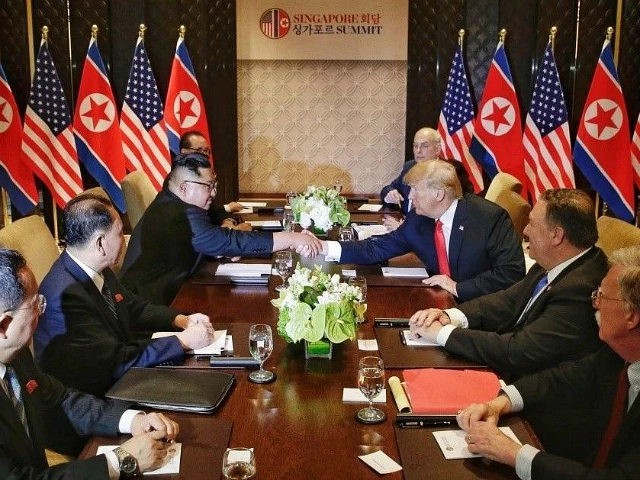China’s Global Times on Thursday took a break from giving China all the credit for the diplomatic breakthrough with North Korea to ensure Japan does not get any. “Japan was a participant in the Six-Party Talks, and is now just a bystander,” the Chinese paper teased.
The Six-Party Talks referred to by the Global Times ran from 2003 to 2009, at which point North Korea busied itself with enriching uranium and began the string of provocations that led to the crisis period of 2017. Despite the fact that half of the six parties had long since departed the bargaining table in frustration, China bizarrely pretended to celebrate the “tenth anniversary” of the talks in 2013.
Japan was notably worried during the Six-Party Talks era that North Korean missile tests could begin threatening Japanese airspace, as indeed became the case last year. North Korean media claimed that dictator Kim Jong-un personally supervised the launch of missiles that came down in the Sea of Japan.
The Global Times sneered on Thursday that Tokyo’s top issue of returning Japanese citizens abducted by North Korea was “not taken up at the summit,” when in fact President Donald Trump did bring it up, and Japanese Prime Minister Shinzo Abe publicly thanked him for it.
The Chinese paper then taunted Japan for underestimating how much diplomatic progress the Trump administration would make with Pyongyang:
After all, North Korea conducted its sixth nuclear test and test-fired ballistic missiles in 2017. Japan was more likely to believe that the US would take high-handed measures to resolve the issue, including preemptive strikes. But after North Korea fired the Hwasong-15 intercontinental ballistic missile which is capable of reaching the entire US mainland on November 29, 2017, its military strength improved and hence gained it more say. Former Japanese prime minister Yukio Hatoyama regarded it a favorable turn for the peninsula’s peace process, for he believed that North Korea’s military breakthrough made it far more dangerous to use force to resolve the issue, and using sanctions to force North Korea to denuclearize had become unrealistic.
After Trump in March expressed his willingness to meet Kim, the US and North Korea started to adjust their policies. In the meeting with Japanese Prime Minister Shinzo Abe on April 18, Trump reaffirmed his proposal made during his election campaign to reduce US troops in South Korea, which should be closely related to his blueprint on the peninsula issue.
After damning Trump with faint praise by suggesting the GOP could really use a Nobel Peace Prize on its mantle in time for the 2018 midterm elections, the Global Times slammed Abe for taking a “tough stance on North Korea,” in particular Abe’s reluctance to suspend joint military exercises with the United States. Suspending those exercises and getting advanced U.S. missile shield equipment out of South Korea is one of China’s top priorities.
This was followed with a nasty little jab that Japan has no moral standing to criticize the North Korean diplomatic process because of Japanese conduct during World War II:
It is Japan’s duty to take responsibility for its aggression in history. Therefore, Japan should unconditionally support the peace process on the peninsula, and it’s not too late to translate the responsibility into action. Japan first needs to stop blindly following the US in East Asian affairs. US troops in South Korea and Japan are the outcome of the Cold War and are behind the times.
From Japanese proposal of the East Asian Community to the Chinese one of a community of shared future for mankind, both show that peaceful development is the theme of the world. If the outcome of the Kim-Trump summit is implemented and the US withdraws troops from South Korea, Japan will have to conform to the trend and US military bases in Okinawa will be the first to be affected. However, the Abe administration hasn’t adjusted its security policy yet and has even advocated building the US military base in Henoko. Japanese people need to lend their voices to change the current situation.
The Chinese may be hoping for a U.S. troop drawdown in South Korea that leaves Japan more vulnerable as well. Beijing has expressed great displeasure with joint naval exercises involving American, South Korean, and Japanese ships.
“On the one hand, the DPRK insists on advancing its nuclear and missile programs in violation of UN Security Council resolutions; on the other hand, the US, the ROK and Japan are conducting large-scale military exercises. This is a vicious circle and an upward spiral of tensions. It will do no good to any country,” the Chinese foreign ministry said after one such exercise in March 2017. (“ROK” is the Republic of Korea, i.e. South Korea. “DPRK” is North Korea’s name for itself, the Democratic People’s Republic of Korea.)
China’s strategic fears include the formation of a NATO-style permanent military alliance between South Korea, Japan, and the United States, and the possibility that Japan will ask for a THAAD anti-missile system like the one deployed in South Korea. China detests THAAD because its powerful sensors are able to penetrate deep into Chinese territory.

COMMENTS
Please let us know if you're having issues with commenting.